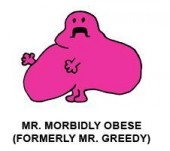I was wading through my Facebook News Feed when I spotted
THIS. That article led me to
New approach to coeliac testing identifies more Australians at risk, which in turn led me to
A novel serogenetic approach determines the community prevalence of celiac disease and informs improved diagnostic pathways (provisional pdf), where I saw:
"HLA-DQ2.5, DQ8, or DQ2.2 was present in 56% of all women and men in the community cohorts."
HLA-DQ2.5, DQ8 & DQ2.2 are the
alleles for Coeliac/Celiac Disease (CD).
"Transglutaminase (TG)-2 IgA and composite TG2/deamidated gliadin peptide (DGP) IgA/IgG were abnormal in 4.6% and 5.6%, respectively, of the community women and 6.9% and 6.9%, respectively, of the community men, but in the screen-positive group, only 71% and 75%, respectively, of women and 65% and 63%, respectively, of men possessed HLADQ2.5, DQ8, or DQ2.2."
There were abnormalities in ~5% of Australian women & ~7% of Australian men, even in those who didn't carry CD alleles.
"...but based on relative risk for HLA-DQ2.5, DQ8, or DQ2.2 in all TG2 IgA or TG2/DGP IgA/IgG screen-positive subjects, CD affected 1.3% or 1.9%, respectively, of females and 1.3% or 1.2%, respectively, of men."
~1.6% of Australian women & ~1.3% of Australian men have CD.
From the discussion: "The concept of a ‘celiac iceberg’ has been important in drawing attention to a large, unrecognized group of patients with CD who do report symptoms considered ‘typical’ of CD [29]. Investigators have proposed expansion of the ‘iceberg’ to encompass patients who are genetically susceptible to CD, but show only raised IEL counts or an isolated abnormal CDspecific serology and normal intestinal histology [30-32]. Consequently, there is considerable uncertainty regarding the true extent of gluten-mediated disease in the community.
Random thoughts: About 1 in 20 Australian women & about 1 in 15 Australian men have some kind of a gut problem (IBS?) due to gliadin, even in those who don't carry CD alleles. The following made me smile.
"Making a diagnosis based on a blood test alone or commencing a
gluten-free diet without a confirmatory bowel biopsy is inappropriate
and can impose an unnecessary and lifelong treatment."
'Cos life without wheat, rye, barley & oats is
such an imposition (undue burden) and everyone just
loves to be given a bowel biopsy. <- sarcasm alert.
From
Ancestry of Australian population: "More than 92 percent of all Australians descend from Europeans. Anglo-Celtic Australians (English, Scottish, Welsh, Cornish or Irish ancestral origin) make up 74 percent of the Australian population."
Most Australians have genes that originate from Britain & Europe. Uh-oh!
Why do only a small percentage of people carrying the CD allele go on to develop CD? I believe that it's down to luck. During digestion,
gliadins are snipped into fragments & amino acids by the
peptidase enzymes
pepsin,
trypsin &
chymotrypsin. Gliadin fragments that contain the wrong triplet of amino acids and that manage to slip through excessively-loose
tight junctions may trigger CD. Once the "damage is done", it only takes a tiny amount of gliadin to provoke an immune response.



















